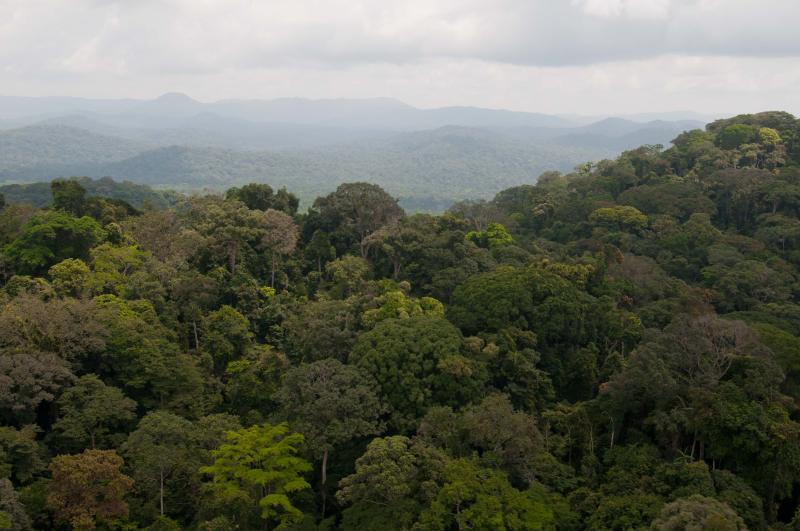

January 10, 2023 (Geneva, Switzerland) – The Central African Forest Initiative (CAFI) was pleased to unveil several groundbreaking developments in 2022, which highlighted the successes of the programming and promoted innovative partnerships and projects funded by the Initiative. The news is an indication of the momentum CAFI-funded projects will experience in the coming months and years.
On December 19, a ceremony was held in Brazzaville to celebrate the signature of the Sustainable Land Use Programme (Programme d’utilisation durable des terres or PUDT in French) in the Republic of the Congo. An ambitious 5-year programme, the PUDT is expected to strengthen the institutional framework and support the country in achieving more than 40% of the engagements set forth in the Letter of Intention (LoI) with CAFI in 2019. With a budget of 24.6 million USD, the programme includes support to the Congolese government in structuring its approach to territorial planning and development of a national land use plan in addition to two pilot departmental plans. An investment programme, approved by CAFI and the Congolese National Steering Committee chaired by H.E. Prime Minister Anatole Collinet Makosso, will inject a further 16.5 million USD from CAFI into the plan, a commitment that enabled the programme to attract an additional 15 million € from the European Union, complemented by another 8 million € from the French Agency for Development (AFD).
On December 16, the Government of DRC and the CAFI Executive Board came to an agreement on the funding of the first batch of programs under the 2nd letter of intent signed with the DRC in Glasgow, as part of the Congo Basin Pledge made at COP 26. As a result, a tranche of 60 million was released from the CAFI Trust Fund, part of the 500 million committed by CAFI to the DRC in Glasgow. The funding will support the reform process initiated during the 1st phase of the partnership, rural development programs in several DRC provinces and investments in the energy, agriculture and family planning sectors.
On December 5, The Sustainable Forest Management Programme (Programme de Gestion Durable des Forêts in French, or PGDF) was officially launched by H.E. DRC’s Deputy Prime Minister in charge of the Environment and Sustainable Development Ms Eve Bazaiba. This long-awaited Programme aims to enable the country to manage its forest resources sustainably. An ambitious programme, the PGDF intends to accomplish its mission through an inclusive process hinging on the involvement of all local actors including the public and private sectors as well as civil society. The current timetable plans for the adoption of a forest policy within the first six months of 2023.
As part of the first day announcements during COP27 in November, CAFI announced two breakthrough engagements in private financing of forest positive projects in the Congo Basin –a first in the region. CAFI’s engagement with the Netherlands-based &Green Fund includes 47 million USD to be provided as donor capital to &Green to promote “derisked” loans: lowering risk for investors and providing opportunities not usually available to local companies committed to sustainable development.
The same day, as Germany is CAFI’s current Chair, Chancellor Olaf Scholz announced the development of Forest Performance Bonds in cooperation with the Green Climate Fund (GCF). The design of these bonds is being undertaken by the United Nations Capital Development Fund (UNCDF).
An essential component of monitoring progress made on political engagements, a ministerial-level meeting was held in October in Kinshasa, DRC, to review progress on the milestones of the 2nd Letter of Intent with DRC. An ambitious number, 80 milestones in total, had been planned over the 5-year period between 2021-26, with the majority set for 2022-23. These milestones span land use & planning, energy, agriculture, forestry, mining, demographics, and governance. CAFI and the DRC Government were pleased to note that with very few exceptions all 2022 milestones were met or on track. Since the objectives of the Letter of Intent are closely linked to frameworks defined during the COP27 on Climate and COP15 on Biodiversity at the end of last year, monitoring their progress jointly is a high-stake exercise. Multi-partite biannual strategic meetings and more high-level political dialogues are being planned in 2023 and beyond.
In July 2021CAFI had announced the first results-based payment of 17 MUSD for Gabon’s reduction of more than 5 million tonnes of CO2 in 2016-2017. As a complement to the three CAFI-funded programmes already underway in Gabon, the payment serves to fund the implementation of five new programmes approved in July 2022, , to: strengthen forest governance through community forestry and forest certification, promote urban green spaces, conduct monitoring and research on forest ecosystems, and safeguard and expand the protected area network
The CAFI Executive Board meeting opened doors to other innovative partnerships and financing mechanisms, including Payment for Environmental Services (PES). Furthermore, as existing partner countries meet criteria set forth in their LoIs, additional projects will be set in motion. In other changes, CAFI’s Chair will be transferred in early 2023, from Germany currently to the United Kingdom.
These announcements demonstrate the commitment of the initiative to continue, both working closely with stakeholders to deliver on decisions made and seeking innovative new ways to fund programmes that protect the vital resources and livelihoods of all life in the Congo Basin.
Originally published on www.cafi.org